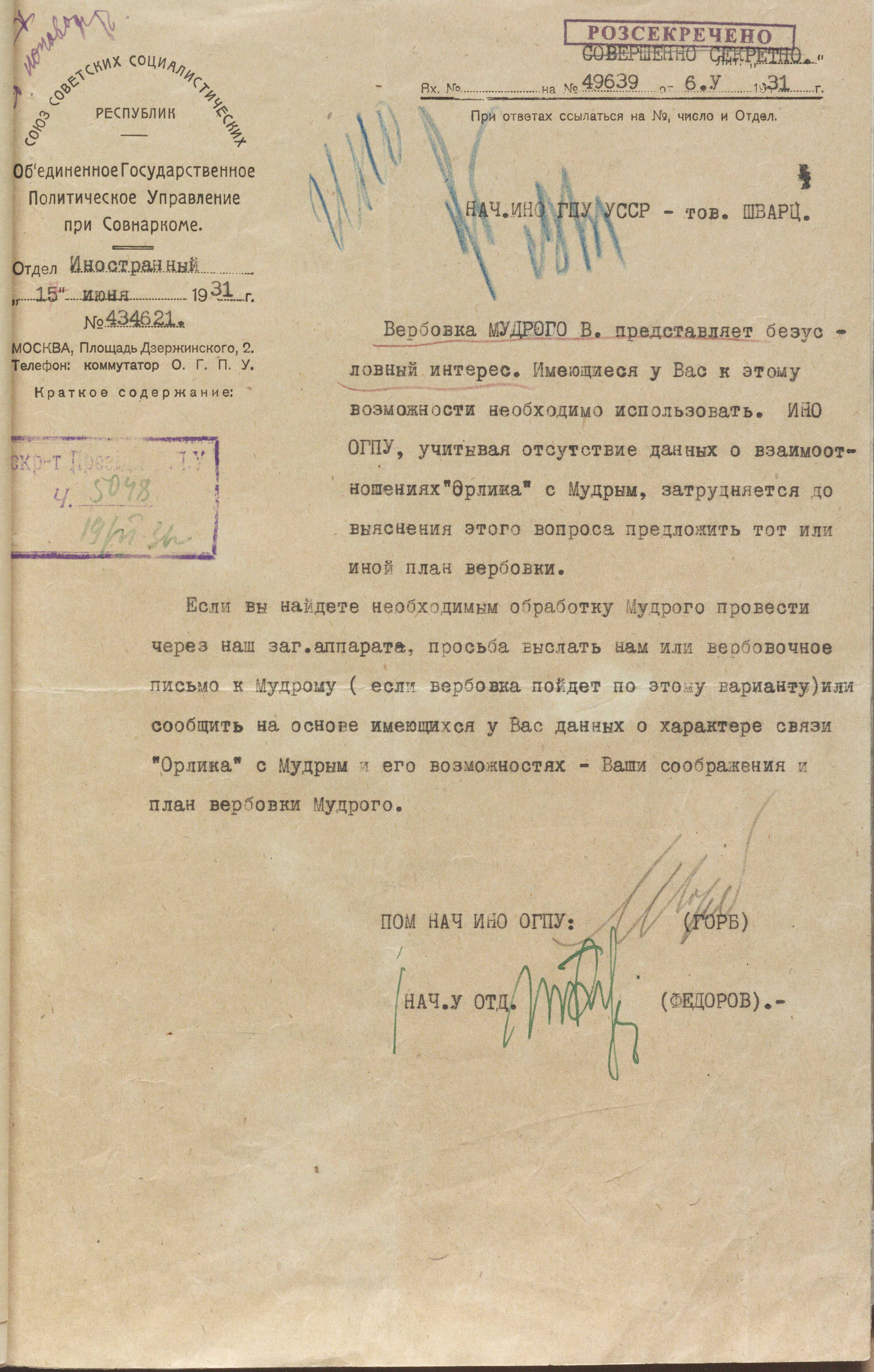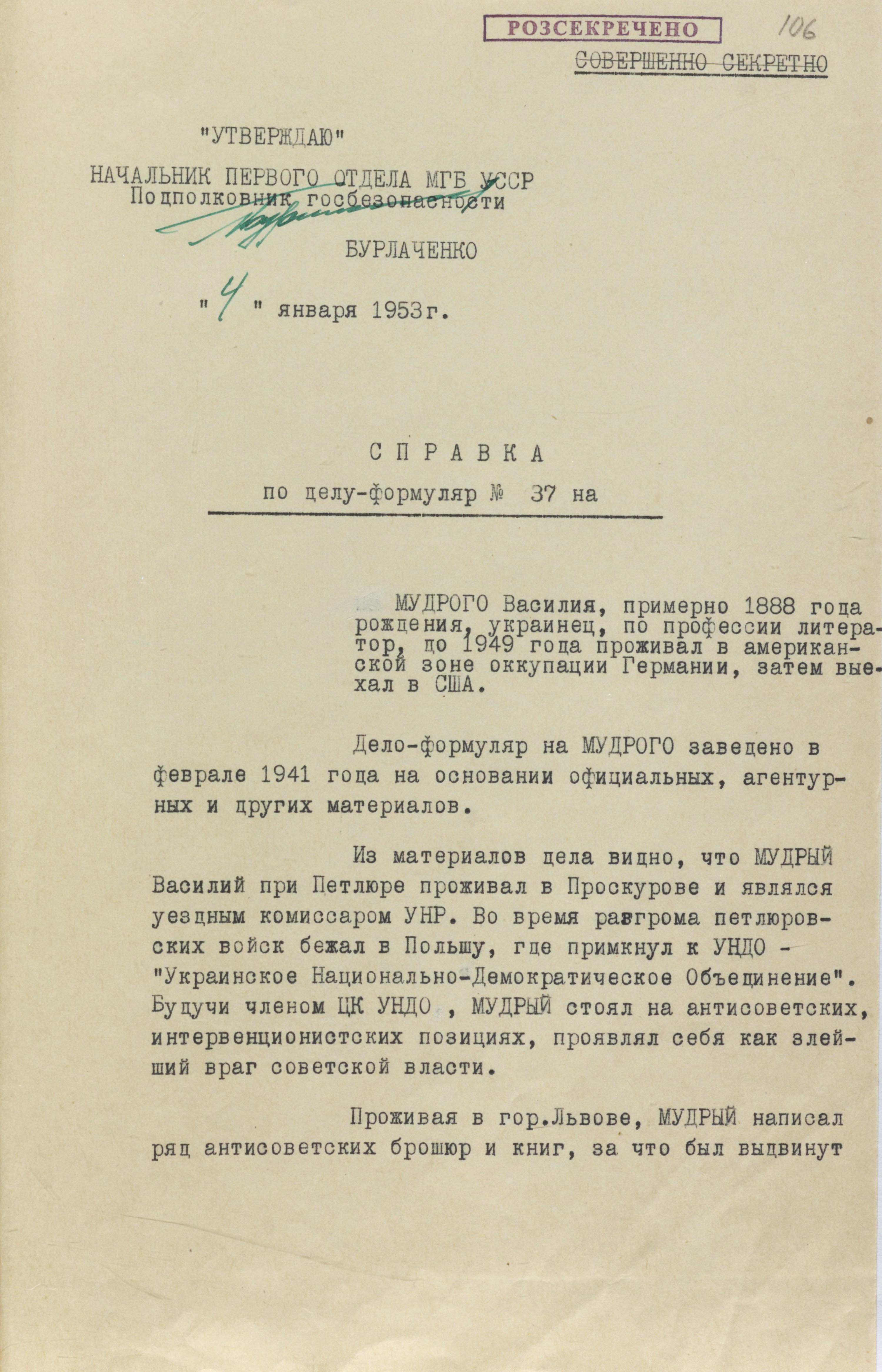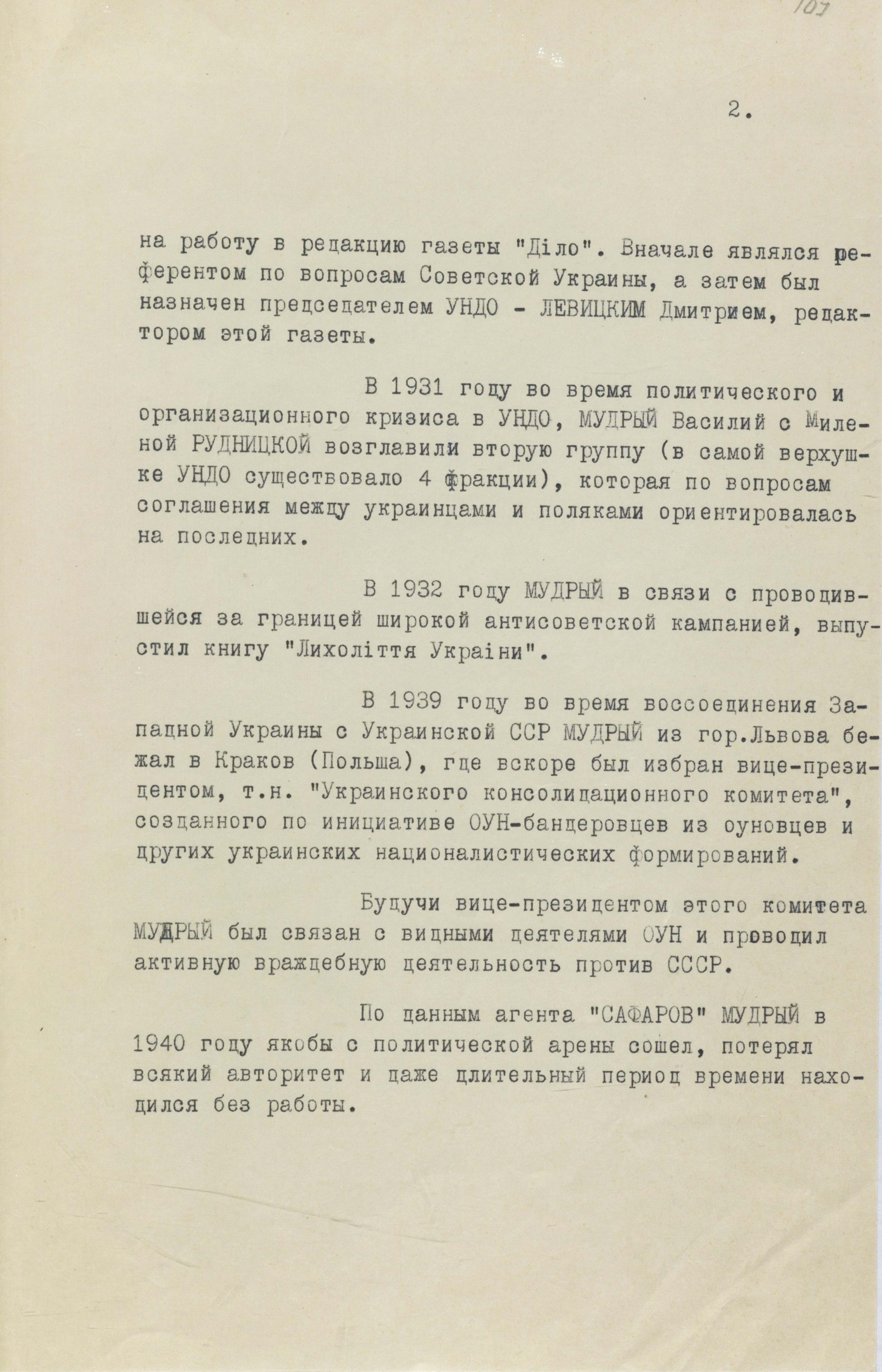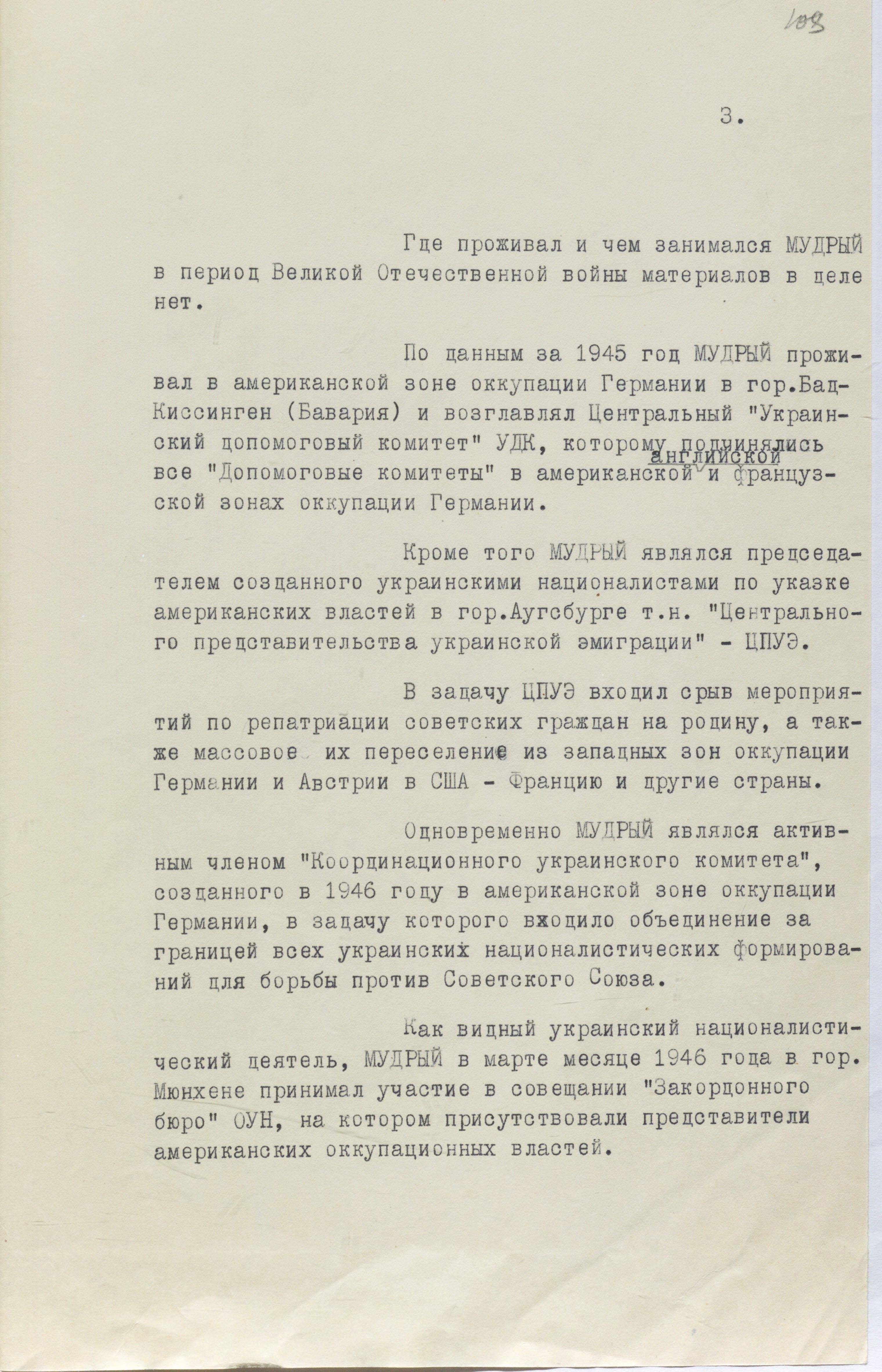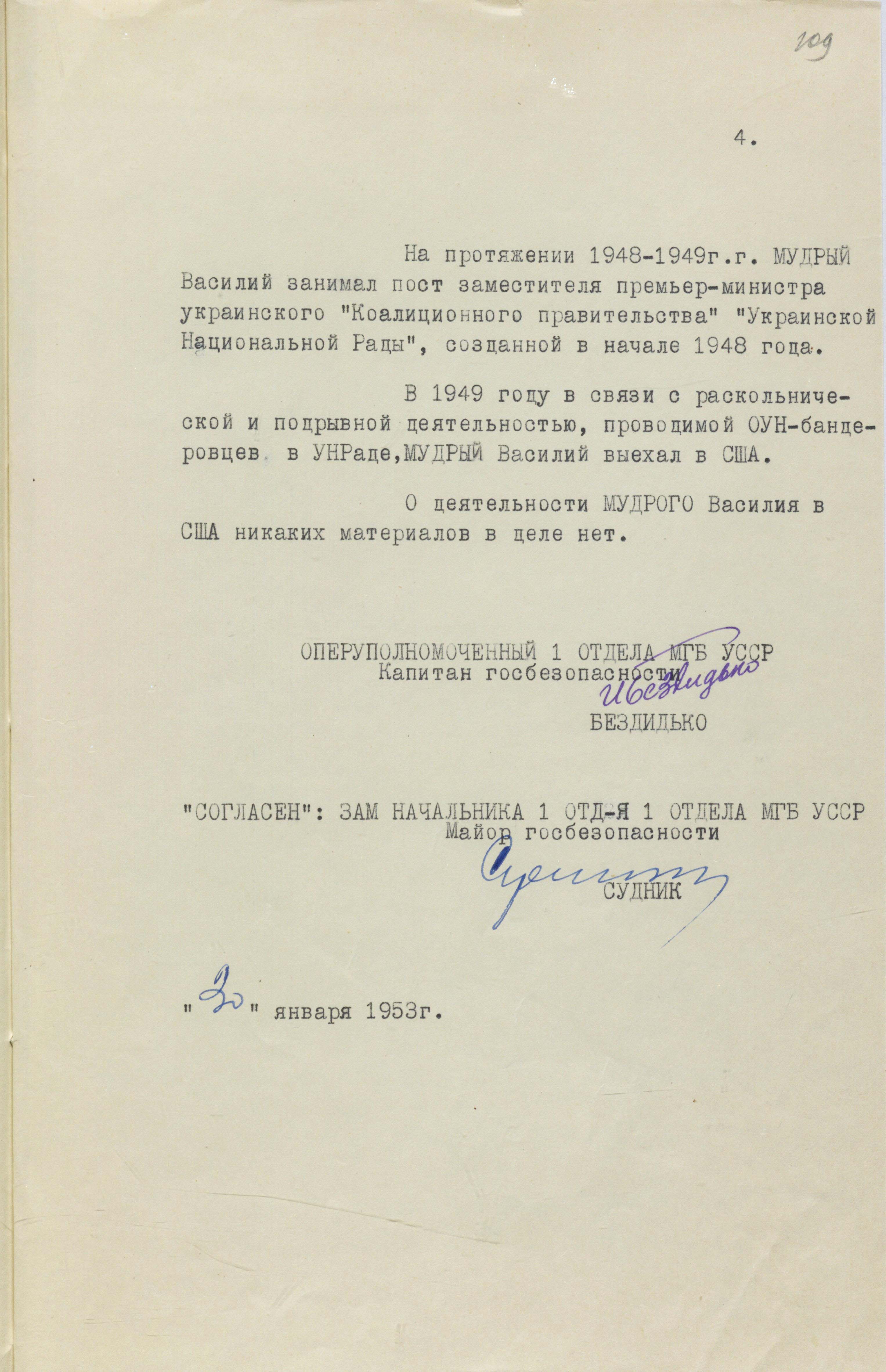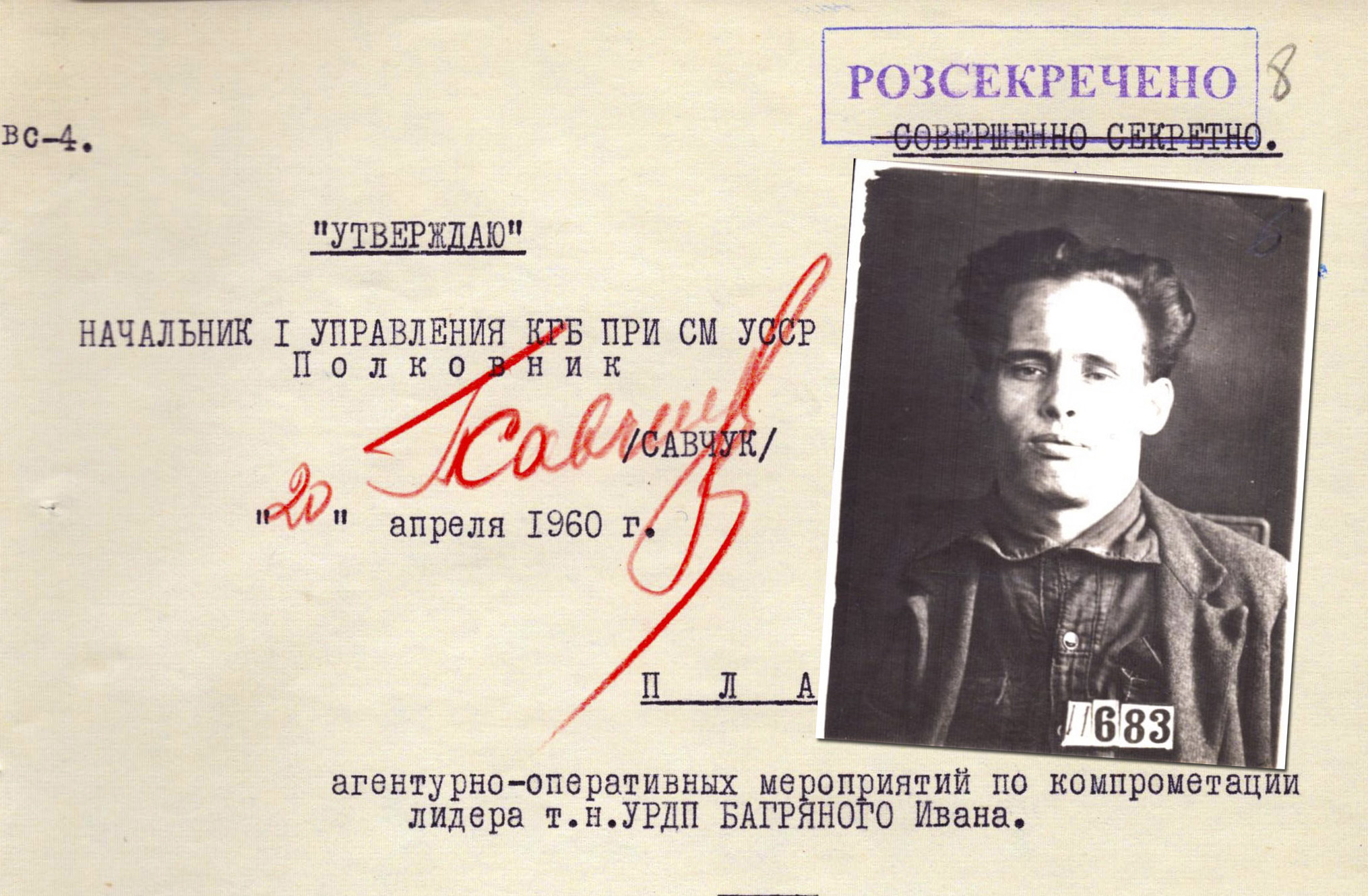“Editor” Vasyl Mudryi and His “Dilo”
3/19/2024
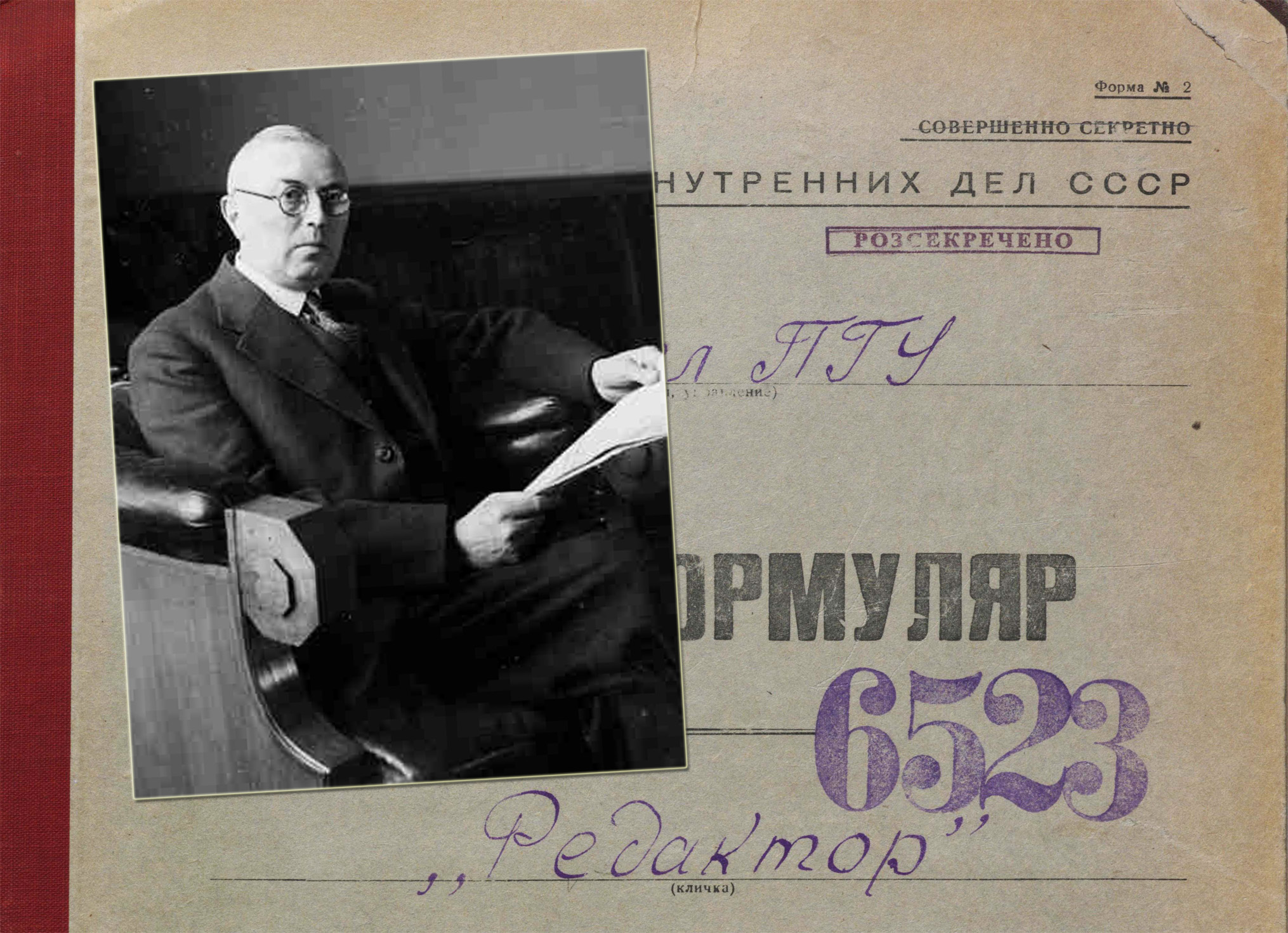
The list of those whom the NKVD wanted to recruit in the 1930s included Vasyl Mudryi, the then Head of the Ukrainian National Democratic Union, the most powerful western Ukrainian parliamentary party, and the Editor-in-Chief of the oldest Ukrainian Galician newspaper, “Dilo”. The declassified documents from the archives of the Foreign Intelligence Service of Ukraine, which supplement the already known facts about the eventful life and work of Vasyl Mudryi (March 19, 1893 – March 19, 1966), tell us why the chekists wanted to have talented journalists, speakers, and members of foreign parliaments in their specific propaganda arsenal.
The case against V. Mudryi was codenamed “Editor”. The decision to open the case was made on February 15, 1935, by Pavlo Sudoplatov, an operative of the “A” group of the Foreign Department of the Main Directorate of State Security of the nkvd of the ussr. At that time, he was already actively working on Yevhen Konovalets, Yevhen Liakhovych, and other figures of the Ukrainian national liberation movement, and had a particularly valuable agent, “Lebed” (Vasyl Khomyak), who helped him gain access to the top officials of Ukrainian emigrant centers abroad. Hence, the temptation to recruit another figure of that level was great.
In the resolution, P. Sudoplatov pointed out that V. Mudryi was “one of the main figures of anti-soviet propaganda against the ussr, an organizer of OUN”. This time, the information about the defendant's involvement in the creation of OUN was inaccurate. At the same time, other materials obtained earlier and attached to the case testified to Mudryi's great importance in emigration, particularly in the public sphere.
One of the first papers on him reads as follows:
“Was one of the most prominent students of the so-called underground Ukrainian university (wrote a book about the work of that university).
Soon worked as a reviewer for the editorial board of “Dilo” on soviet Ukraine, and was considered an expert in these matters...
When editor of “Dilo” Fedortsev, finally switched to the sovietist platform, Head of the UNDO Dm. Levytskyi nominated Mudryi as editor-in-Chief of the “Dilo”.
Gradually, Mudryi moved to the positions of UNDO leadership (anti-soviet, interventionist, Catholic).
Together with Dm. Levytskyi, Tselevych, and Makarushka, he prepared anti-soviet resolutions at the UNDO Congress in 1932.
In 1933, Mudryi published the book “The Hardships of Ukraine”. Belongs to the group of the greatest enemies of the ussr”.
(BSA of the SZR of Ukraine. - F.1. - Case 7637. - Vol. 1 - P. 27).
This was by no means complete information. According to other sources, V. Mudryi was born in the village of Vikno in Ternopil region, graduated from the Ukrainian gymnasium in Ternopil, and studied at the Faculty of Philosophy of Lviv University. In 1921-1925, he was a co-founder and secretary of the Lviv Secret Ukrainian University, which is described in the nkvd's report. He held the position of Editor-in-Chief of the “Dilo” newspaper from 1927 to 1935. In 1925, he co-founded the Ukrainian National Democratic Alliance (UNDO) and served as its Head from 1935 to 1939.
The UNDO was the most powerful western Ukrainian parliamentary party of the 1920s and 1930s. Its program was based on the ideology of unity and statehood, democracy, and anti-communism. The party had its branches in all cities, towns, and large villages of Galicia and partially in Volyn. It participated in the elections to the Polish Parliament, had its own factions in both Houses of the Parliament and representatives in the Presidium of the Sejm and the Senate, and was an influential force in the political life of Rzeczpospolita. V. Mudryi, as the Head of UNDO, also had a parliamentary mandate and was even elected Vice-Marshal of the Sejm. In 1935, after negotiations with the Polish government, he and a group of like-minded people proclaimed a policy of normalizing Polish-Ukrainian relations in Western Ukraine and actively defended this position from the rostrum.
All of this was of great interest to Stalin's special services, which kept their eye on Mudryi since 1931. A letter from moscow to Chief of the Foreign Department of the GPU of the Ukrainian ssr comrade Schwartz, read as follows: “Recruiting V. Mudryi is of undoubted interest. You should use the opportunities you have for this... If you consider it necessary to cultivate Mudryi through our foreign agentura, please send us a recruitment letter...” (BSA of the SZR of Ukraine. - F.1. – Case 7637. - V. 1 - P. 4).
To resolve this issue, they began to look for approaches through close relatives. Soon they focused on Volodymyr Ivanchuk, whose sister was V. Mudryi's wife. For some time, they collected information about him in order to engage him in cooperation, then bring him to Poland and through him try to persuade V. Mudryi himself to cooperate. But after studying him, they came to the conclusion that his brother-in-law was an ardent Petliurist and did not sympathize with the soviet power. He did not agree to cooperate “sincerely” and “did not provide any materials on the Ukrainian counterrevolution”. Therefore, according to archival documents, “in 1933 he was arrested in the cases of “Insurgents” and “UVO”, held in custody in the Vinnytsya Regional Department of the gpu, and soon, was sentenced by a “Troika” and shot dead”.
The fragmentary information that chekists did manage to collect on V. Mudryi shows that as an ambassador to the Polish Sejm from the Lviv constituency, he “had great authority and popularity, especially among the intelligentsia and conscious peasantry in Galicia”. He defended Ukrainian interests in every way possible and tried to prevent conflicts between Ukrainians and Poles, which were not uncommon at that time.
There is an interesting episode in this regard. When Czechoslovakia collapsed under the onslaught of Nazi Germany, and Carpathian Ukraine was proclaimed in Zakarpattia (Transcarpathia- Transl.) Ukrainian youth began to join the ranks of UNDO en masse and intended to go there and help defend Ukrainian statehood. This movement, as noted in one of the archival documents, caused dissatisfaction with the Polish government, which began to persecute those who advocated for the Ukrainian national revival and even arrest those who sought to enter Zakarpattia. One of the Ukrainian leaders addressed V. Mudryi on this issue and asked him to protest such repressions in the Sejm. To this, the latter allegedly replied that “we should not do something that irritates the Poles and brings us little results”. He meant that if the Poles did not like the massive number of Ukrainians joining the UNDO, it was better to restrain this process, because strength is not in quantity, but in quality, and that it was better to have a dozen dedicated people than thousands of members on paper.
V. Mudryi advocated evolutionary processes of self-organization of Ukrainian civil society, tolerance in relations with other nations, cooperation with all democratic forces of Poland of that time, and parliamentary, legal means of achieving political goals. In this context, his position in the first days of Hitler's invasion of Poland was quite logical and consistent. On September 2, 1939, in Warsaw, at the last session of the Sejm, V. Mudryi declared on behalf of the Ukrainian parliamentary representation that Ukrainians in the Army would fulfill their civic duty to defend the Polish state.
Among the archival documents of the Intelligence Service there are interesting testimonies from Volodymyr Tselevych, Mudryi's colleague in the party, the Secretary General of UNDO and the Ambassador to the Sejm of Rzeczpospolita. In September 1939, he was arrested by the NKVD in Lviv and subjected to numerous interrogations. They tried to learn as much as possible about V. Mudryi.
Here are some extracts from one of the interrogations:
“Vasyl Mudryi... served in the UGA and was in Ukraine with it. Under Petliura's government, he was a civilian commissioner in Proskuriv...
In the “Dilo” he wrote mostly about the situation in the ussr and soviet Ukraine. He considered himself an expert in those matters because he was in Ukraine...
Mudryi was one of the few people who systematically read soviet newspapers and other literature.
Mudryi played a leading role in UNDO. He was the author of the UNDO program, usually the author of resolutions adopted by the Central Committee and the UNDO Congress...
Mudryi was the author and soon an ardent defender of the resolution on the autonomy of Western Ukraine within the Polish state...
As a personality, Mudryi is a very interesting type. He is very stubborn, unbreakable, and resolutely defends his views, whether they are right or wrong. He does not take into consideration the opinions of others. He is very distrustful, not open, and does not like to consult. He does not have enough education to be a leader, but still stands above Dmytro Levytskyi. I was on good terms with Mudryi, but even with me he was not completely frank.
Mudryi lived exclusively on the salary he received as a member of the Sejm and the Vice Marshal of the Sejm – about 900 zlotys a month, and he had no property...
The last time I saw Mudryi was during the days when the Red Army captured Lviv. I recall the circumstances of our last meeting. Once, through the window of my apartment, I saw Mudryi walking down the street. I went downstairs and called him. Mudryi told me that he was leaving Lviv and would consider me crazy if I stayed in the city...
In my last conversation with him, he assured me that the bolsheviks would arrest and shoot all of us”.
(BSA of the SZR of Ukraine. - F.1. - Case 7637. - Vol. 2 – P. 99-104).
This is exactly what happened to V. Tselevych. According to some reports, he died in the early 1940s in a prison in saratov. The same fate could have awaited V. Mudryi, had he not left Lviv in time. At that time, the checkists did not give in on his recruitment, but their plans now were not to persuade him to cooperate by any ideological influence, persuasion, or encouragement. The intention was to blackmail close relatives who did not have time to leave and were de facto held hostage by the stalinist system.
One of the documents of the nkvd of the Ukrainian ssr, dated November 1939, reports that the wives and children of well-known Ukrainian figures remained in Lviv. “Certainly”, the document reads, “these people will look for ways to establish contacts with their families and may try to take them abroad. We must not allow this to happen in any way. The stay of these families in Lviv should be used for operational purposes, and a number of agentura combinations should be created to acquire valuable agents from this category. Special attention should be paid to the cultivation of the wives of Mudryi, Paliyev, Holiyan...” (BSA of the SZR of Ukraine. - F.1. - Case 7637. - Vol. 2 - P. 98).
At the same time, no documents were found in the archival collections that would show that the chekists succeeded in implementing such a plan. In the future, they tracked V. Mudryi's movements and activities only from reports of their foreign agents and press publications. On the basis of this, they compiled generalized information about him. One of the papers states that he left Lviv for Krakow, where he was soon elected Vice President of the Ukrainian Consolidation Committee, created on the initiative of the OUN (B) from members of various Ukrainian national groups. In this position, he allegedly worked closely with prominent OUN leaders and conducted active anti-soviet activities.
The NKVD failed to find out what V. Mudryi was doing during World War II. He came to the attention of the authorities again only in 1945. Documents say that he lived in the American zone of occupation of Germany in Bad Kissingen and headed the Central Ukrainian Aid Committee, which was subordinate to all Aid Committees in the American, British, and French zones of occupation. In addition, he was the Head of the Central Mission of Ukrainian Emigration, whose tasks included obstructing measures to forcibly repatriate soviet citizens to the ussr, as well as assisting in the mass resettlement of them from western occupation zones of Germany and Austria to the United States, England, France and other countries.
At the same time, V. Mudryi, as noted in the papers, was an active member of the Ukrainian Coordination Committee, established in 1946, whose tasks included “uniting all Ukrainian nationalist formations abroad to fight against the soviet union”. In 1947, he resumed the activities of the Ukrainian National Democratic Association. In 1948-1949, he served as Deputy Prime Minister of the Ukrainian coalition government, the Ukrainian National Rada.
The dossier collected by the chekists ends with the information that V. Mudryi left for the United States in 1949 as a representative of the Ukrainian emigration government and was “the Executive Director of the United States-Ukraine Aid Committee" (i.e., the Executive Director of the Ukrainian Congress Committee of America). The last document is dated 1959.
But it was just a record of events and facts. Neither deep agent cultivation of V. Mudryi nor any influence on him, let alone attempts to recruit him, was ever carried out. At the same time, declassified documents and profiles show that even if it had been possible to get closer to him, such intentions were doomed to failure. Everything indicated that V. Mudryi would not have cooperated under any circumstances. After all, throughout his life, he consistently stood on the position of a Ukrainian patriot and a consistent fighter for the Ukrainian cause.
To his last days, Vasyl Mudryi served as Executive Director of the Ukrainian Congress Committee of America, was Head of the Association of Ukrainians in America “Samopomich” and Editor of its publication “Novyi Svit”, a full member of the Shevchenko Scientific Society and a member of its Main Rada, and wrote books and articles on various topics. He passed away in New York on March 19, 1966.

